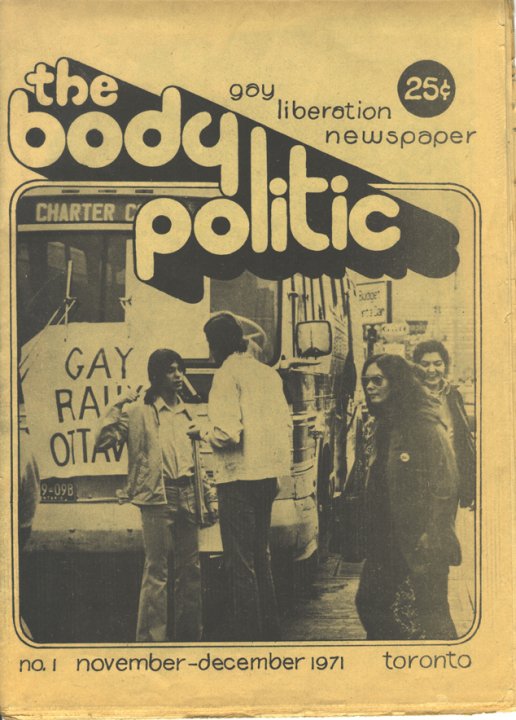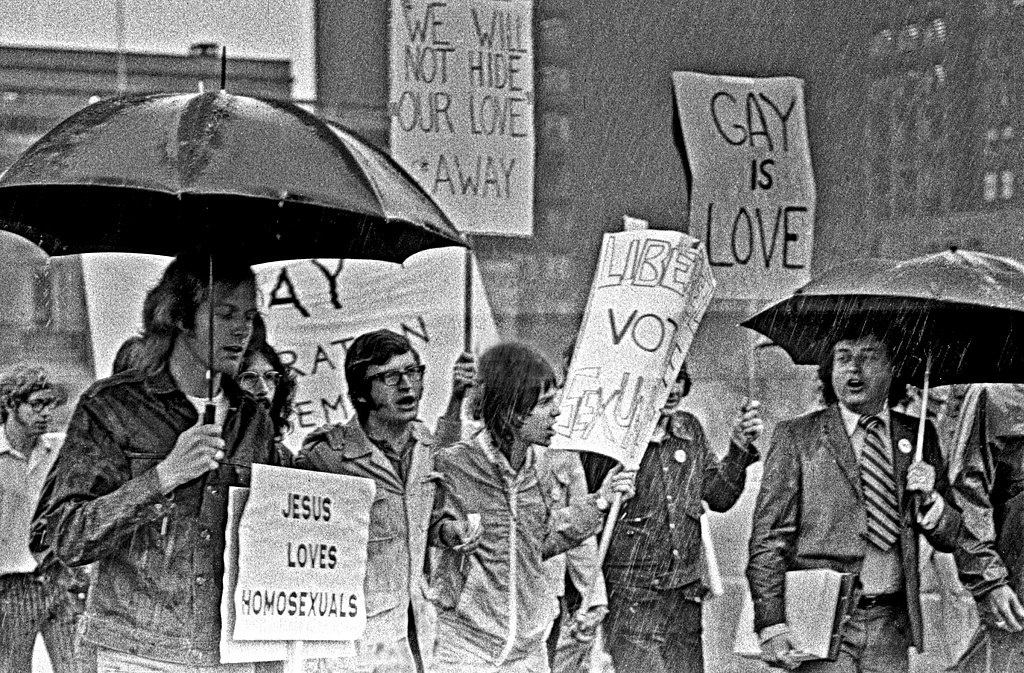The Body Politic was an influential Toronto-based monthly newspaper. Published from 1971 until 1987, it was the leading organ of Canada’s gay liberation and lesbian feminist movements. Read by gay activists around the world, the Body Politic challenged sexual orthodoxies, documented community resistance, and celebrated queer history and culture. It reported incidents of discrimination, police harassment and media homophobia, as well as activist efforts to pressure governments to change discriminatory laws. Complete issues of the newspaper formed the basis of the ArQuives, now one of the largest independent LGBTQ2 archives in the world.

Background
The Body Politic’s launch was an outgrowth of the We Demand march in Ottawa on 28 August 1971. It marked the beginning of Canada’s gay liberation and lesbian feminist movements. Gay activist Jearld Moldenhauer announced the first planning session for the publication at a meeting of Toronto Gay Action in September 1971. He is credited with being the driving force behind the paper.
The first issue of the Body Politic went on sale on 28 October 1971. It announced itself as a “gay liberation newspaper.” In its inaugural edition, it called for the mobilization of “the thousands of gays who have the power to change the laws and institutions in society which perpetuate our oppression.” The paper further asserted, “It must be the concern of every gay person to attain civil rights for all.”

Significance
The paper quickly became a key voice, read by gay activists around the world. Its writers challenged sexual orthodoxies, documented community resistance, and celebrated queer history and culture. The paper documented incidents of discrimination, police harassment, media homophobia, and activist efforts to pressure governments to change laws and regulations that discriminated against Canada’s queer communities.
Notably, in 1981, the Body Politic played a pivotal role by organizing the protests following the notorious bathhouse raids of 1981. The paper played a central role in covering the aftermath of the raids. It was also the first Canadian publication to report on the AIDS crisis. At its peak in the early 1980s, the publication reportedly had a circulation of more than 7,000 copies.

Operation
Tim McCaskell, a long-time member of the Body Politic, has described its evolution. Noting that it was run democratically, with its output initially controlled by a collective, he added, “Over the years, it developed more and more like an editorial board. By the end it was a pretty big operation. There were probably around 100 volunteers who did all kinds of different tasks from distribution to copy editing to layout.”
Notable writers who contributed to the Body Politic included Michael Lynch, Stephen O. Murray, John Greyson, David Rayside, Ian Young, Ed Jackson, Sue Golding, Thomas Waugh, John Alan Lee and Gary Kinsman.
Pink Triangle Press, a collective formed by the newspaper’s staff, took over the publication in 1975. It also published the widely read queer newspaper Xtra beginning in 1984. Xtra proved so successful that Pink Triangle Press ceased publishing the Body Politic in 1987.

Criticisms
The Body Politic was run primarily by white, middle-class cisgender gay men. As such, it occasionally faced criticisms about lack of representation. For example, women played a minor role in the publication, which was accused of being less sensitive to gender inequalities within the communities it sought to represent. A 1974 letter to the editor stated, “For a paper which purports to represent the gay community, I find it extremely male-oriented, aside from the few token articles on women.”
The collective that ran the paper also tended to be dominated by young university activists whose writings and outspoken demands for equal rights did not sit well with some in the LGBTQ2 community. This was at a time when, McCaskell said, “You could be thrown out of your apartment, lose your job, and be refused service in a restaurant because you were gay. Coming out was not perhaps the cleverest thing to do for a whole lot of people.” He added, “If you look at some of that early writing at the Body Politic… the average person on the street wouldn’t get through the first paragraph. It did not say anything to them.”
Controversies and Court Cases
The Body Politic was embroiled in a legal battle set in motion by its November 1977 publication of an article titled “Men Loving Boys Loving Men,” written by Gerald Hannon. On 30 December, police undertook a raid and seizure at the paper’s office. After the raid, police charged three directors (Gerald Hannon, Ed Jackson and Ken Popert) of Pink Triangle Press with an obscenity-related statute in the Criminal Code: “use of the mails for the purpose of transmitting or delivering anything that is obscene, indecent, immoral or scurrilous.” Jackson, secretary of Pink Triangle Press, later recalled, “We found ourselves fighting for our survival in a very hostile world, some of it coming from our frightened community.”
On 14 February 1979, Pink Triangle Press and its defendants were found not guilty. During the six years following the initial charges, there were two trials, one retrial, numerous Crown appeals, and fundraising efforts to cover legal costs.
Members of the community at large came to the paper’s defence, including then-mayor of Toronto, John Sewell. He defended the Body Politic at a rally on 3 January 1979. His remarks caused a media uproar. However, most of the hundreds of letters and telephone calls received at the mayor’s office supported his stand. Sewell later remarked, “It seemed natural that I should be speaking out in favour of freedom of the press.”
On 6 February 1980, the Body Politic Free the Press Fund published a full-page ad in the Globe and Mail, with the heading, “We urge the Attorney-General of Ontario to drop the appeal against The Body Politic,” followed by the names of more than 800 supporters. The ad was published to coincide with the hearing concerning Pink Triangle Press’s acquittal, scheduled for the next day. This was the first time an advocacy ad for a gay cause was published in a Canadian daily newspaper.
The ArQuives
In 1973, Jearld Moldenhauer and Ron Dayman, another collective member, recognized the archival and historical value of the publication’s editorial collection. They used complete issues of the paper to form the core of the Canadian Lesbian and Gay Archives, now known as the ArQuives. It is one of the largest independent LGBTQ2 archives in the world. It contains every issue of the Body Politic.
See also Queer Culture.

 Share on Facebook
Share on Facebook Share on X
Share on X Share by Email
Share by Email Share on Google Classroom
Share on Google Classroom



